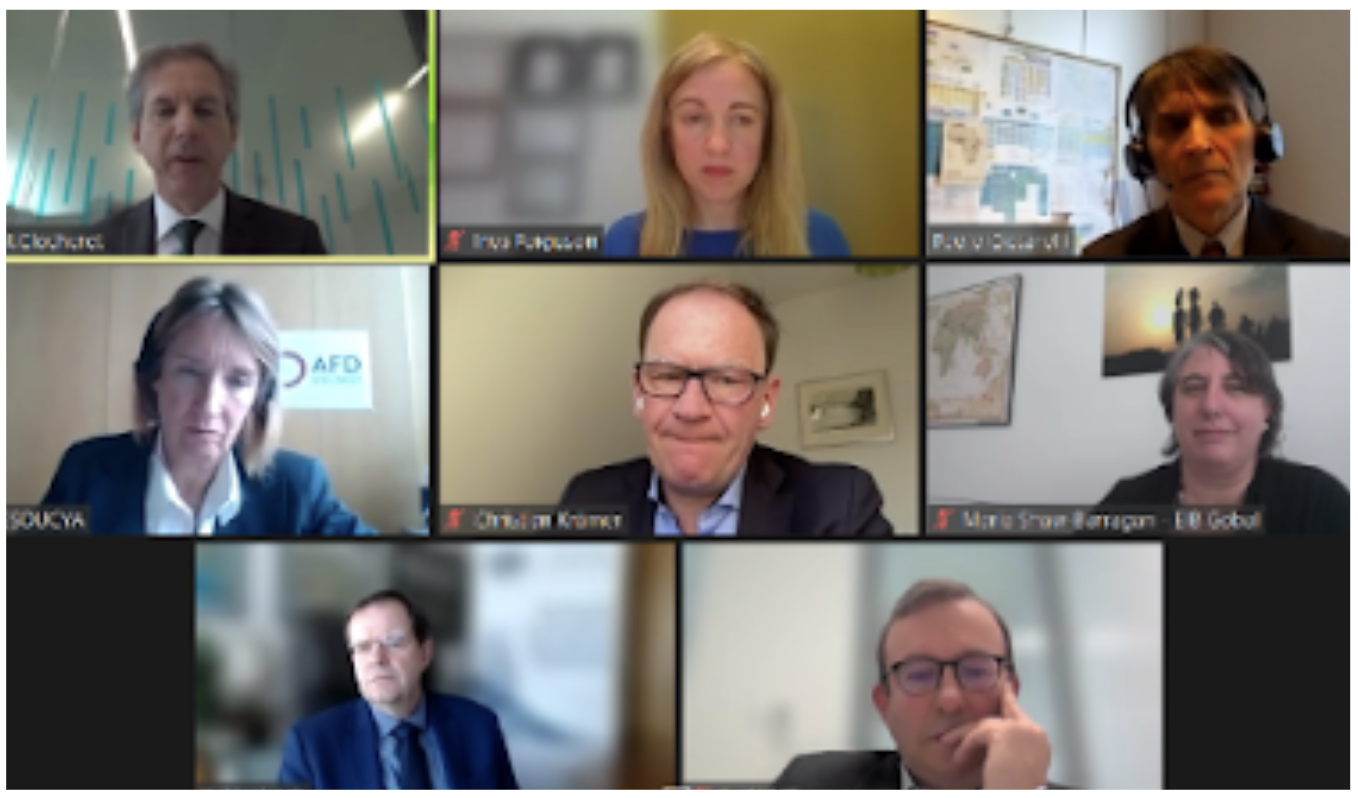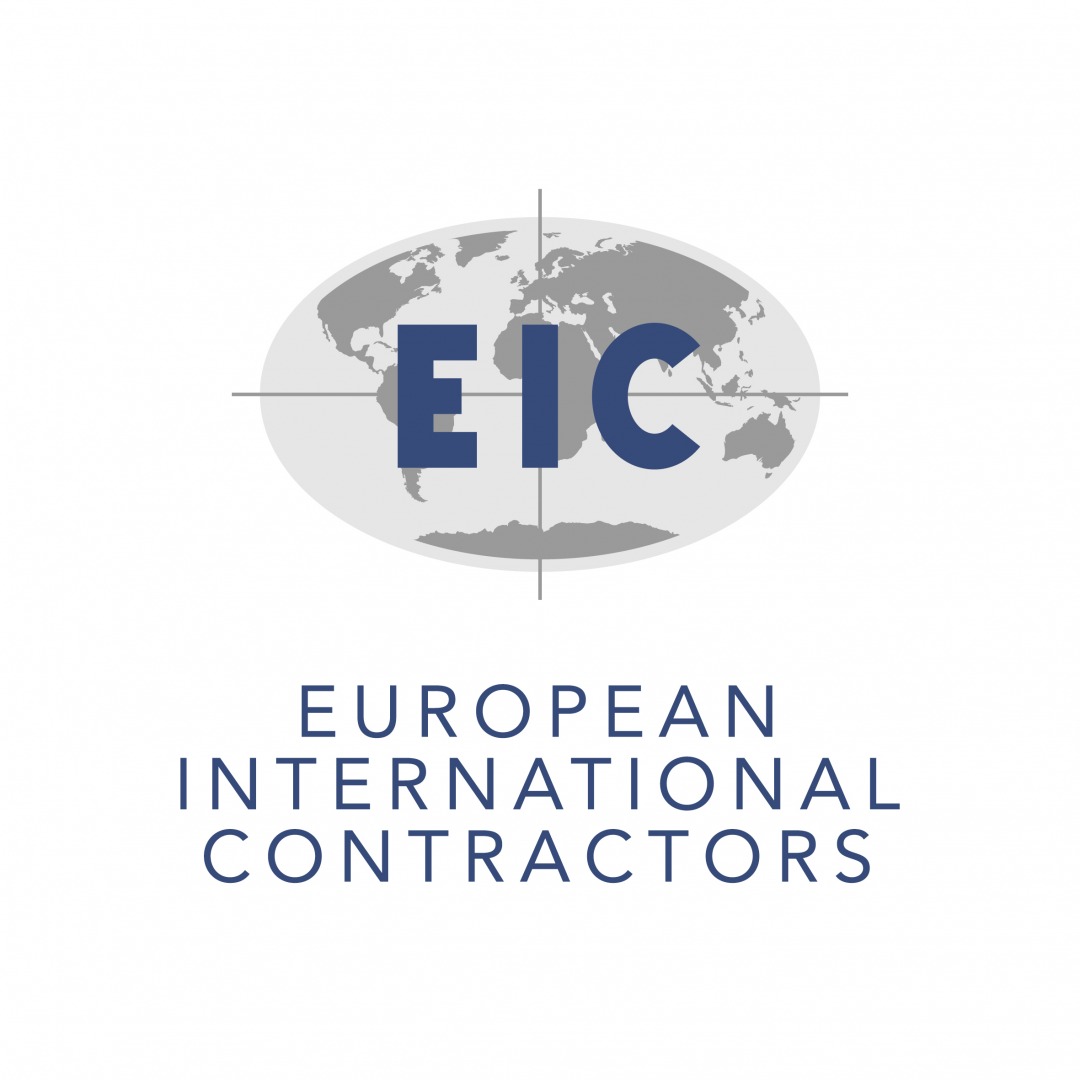European International Contractors (EIC) has as its full members construction industry trade associations from fifteen European countries and represents the interests of the European construction industry in all questions related to its international construction activities. According to the ENR Statistics, internationally active European contractors associated with EIC’s members federations collectively recorded in 2021 an annual international turnover of around €200 billion.
I. Organisation
EIC was founded in 1970 and is registered since 1984 as a legally independent business association under German law. Its mandate is to promote the interests of the European construction industry in relation to its international business activities.
The mission of EIC is to advocate fair international competition based on sustainable, quality-based procurement and fair contract conditions, to promote effective development and export finance schemes for construction services and to provide a unique networking forum between the industry and other stakeholders.
At the end of October 2022, the composition of the EIC Board was as follows:
President: Benoît Chauvin (Colas, France)
Vice President: Philippe Dessoy (Besix, Belgium)
Treasurer: Jesper Arkil (Arkil, Denmark)
Başar Arioğlu (Yapi Merkezi, Turkey)
Nils Bjelm (NCC, Sweden)
Niels de Bruijn (van Oord, The Netherlands)
German Grueniger (Implenia, Switzerland)
Zoe Lisaridou (Avax Group, Greece)
Juha Kostiainen (YIT Corporation, Finland)
Gustávo Martínez (Ferrovial, Spain)
Manuel Mota (Mota-Engil, Portugal)
Luigi Realini (Pizzarotti, Italy)
Karl-Heinz Strauss (PORR, Austria)
Jörg Wellmeyer (Strabag International, Germany)
Philip Crampton (FIEC President)
President Chauvin represents EIC as Vice-President on the FIEC Steering Committee.
Vice President Dessoy represents FIEC and EIC as Vice President on the CICA Board.
II. Fair international competition
After more than a decade of legislative preparations and discussions, in which EIC and FIEC were at the forefront of pushing for the adoption of such legal instrument, the European Union adopted in June 2022 the so-called ‘International Procurement Instrument’ (IPI) which entered into force at the end of August 2022. It provides for a new trade policy tool which is designed to address the lack of a level playing field in global procurement markets. EIC welcomes that the European Commission may now impose measures limiting non-EU companies’ access to the EU public procurement market if these companies’ governments do not offer similar access to EU businesses. Once a discriminatory legislative, regulatory or administrative measure, procedure or practice in a third country has been legally established, the Commission may either use a score adjustment that negatively affects the evaluation of bids submitted by bidders from such third country or by excluding bids by that third country’s bidders altogether. During the final stages of the legislative negotiations, EIC convinced the EU legislator to narrow down possible exceptions for contracting authorities and entities from EU member states to the extent that they are not allowed to bypass the application of an IPI measure under the pretext that the application of such measure would lead to a disproportionate increase in the price or costs of the contract. Such provision would have had the potential to turn the exception into consistent practice given that experience has shown that state-owned enterprises from a certain third country have the capability to offer abnormally low tender prices for construction projects.
EIC and FIEC also collaborated on promoting the position of the European construction industry with respect to an upcoming new Regulation on foreign subsidies distorting the internal market (FSR). On 30 June 2022, the Council and the European Parliament reached political agreement on such regulation which is expected to be formally adopted in the fourth quarter of 2022. Whilst EIC regrets that the EU legislator has not taken up our suggestion to incorporate a legal presumption into the Regulation that state-owned enterprises from non-market economies are deemed to be subsidised until the contrary is proven, we welcome that the FSR entitles the European Commission to conduct a market investigation when information available substantiates a reasonable suspicion that foreign subsidies in a particular sector, for a particular type of economic activity or based on a particular subsidy instrument may distort the internal market.
III. Africa
In a presidential letter to the EU Commissioners for International Partnerships, Jutta Urpilainen, and for Trade, Valdis Dombrovskis, EIC President Benoît Chauvin welcomed the new EU Global Gateway Strategy which was adopted in December 2021 and pursues the aim to boost smart, clean and secure links in digital, energy and transport sectors across the world. At a high level panel during the EU-Africa Business Forum in February 2022, President Chauvin called in the presence of the responsible EU and African Union Commissioners upon the EU to consider additional strategic measures to enhance the Global Gateway’s impact, such as the systematic involvement of Export Credit Agencies (ECAs) in Global Gateway’s investment and delivery model, a comprehensive financing mandate for the EIB and rules for sustainable procurement in the context of EU Global Gateway.
EIC President Benoît Chauvin at 7th EABF 2022
To elaborate on the full scope of the EIC recommendations, EIC and EFCA jointly organised a Webinar with high-level representatives from eminent European development finance institutions, namely EIB, AFD and KfW, to discuss the corresponding business opportunities for European international contractors and consultants.
Joint Webinar EFCA/EIC 2022
-
FIDIC Standard Forms of Contract
In the light of the twin challenge of the Covid pandemic and the Russian military invasion of Ukraine, the EIC Working Group ‘Contract Conditions’ prepared in June 2022 a public Statement on ‘The Impact of the Russian-Ukrainian War on Construction Contract and New Tenders’. In the light of the supply chain disruptions resulting from the military conflict, the EIC Statement calls upon all participants of the construction industry, i.e., employers, financiers, consulting engineers and contractors, to engage constructively, whether on existing contracts or on future contracts and to make full allowance for the balanced share of the risk necessary for the proper implementation of international construction projects. In September 2022, an EIC delegation was invited to participate in the bi-annual Meeting of the Heads of Procurement of the Multilateral Development Banks where present MDB representatives assured EIC of their support for the EIC Position even though they declined to express such policy approach in a public statement.
IV. FIDIC Standard Forms of Contract
In the light of the twin challenge of the Covid pandemic and the Russian military invasion of Ukraine, the EIC Working Group ‘Contract Conditions’ prepared in June 2022 a public Statement on ‘The Impact of the Russian-Ukrainian War on Construction Contract and New Tenders’. In the light of the supply chain disruptions resulting from the military conflict, the EIC Statement calls upon all participants of the construction industry, i.e., employers, financiers, consulting engineers and contractors, to engage constructively, whether on existing contracts or on future contracts and to make full allowance for the balanced share of the risk necessary for the proper implementation of international construction projects. In September 2022, an EIC delegation was invited to participate in the bi-annual Meeting of the Heads of Procurement of the Multilateral Development Banks where present MDB representatives assured EIC of their support for the EIC Position even though they declined to express such policy approach in a public statement.
V. Carbon Neutrality Policy Manifesto / Sustainability
Prepared by the Joint EIC-ENCORD-FIEC Working Carbon Neutrality, EIC submitted a response to the EU consultation on “Scenarios for a transition pathway for a more resilient, greener and digital construction ecosystem”. In the submitted document, EIC laid out its recommendations and concerns, especially regarding regulatory pitfalls, supply chain bottlenecks and commercial challenges including the lack of data sovereignty, missing certifications and a constant preference for low price offers. These concerns are also subject of the upcoming Policy Manifesto on “A Vision for Carbon Neutral and Resource Efficient Construction Ecosystem” that is currently finalised by the Joint Working Group.
VI. EU legislation on Supply Chain Responsibility
On 23rd February 2022, the European Commission presented its proposal for a Directive on Corporate Sustainability Due Diligence which aims to foster sustainable and responsible corporate behaviour throughout global value chains. The EIC Working Group ‘Corporate Governance’ met several times to analyse the Commission’s proposal in-depth and to prepare a position on this important matter which was subsequently aligned with the FIEC position. The Working Group also elaborated several amendments on the Commission proposal, such as focusing the Directive on the effective and uniform EU-wide application of the UNGP and the OECD MNE Guidelines as the international established and recognised reference instruments for responsible business conduct. EIC also asked that the corresponding obligations must provide a level playing field between EU and non-EU construction companies whilst avoiding disproportional obligations for SMEs
VII. EIC Workshops
EIC and its Portuguese Member FEPICOP convened more than 100 participants at EIC’s first post-Covid physical Spring Conference 2022 on 29 April 2022. During the Workshop titled ‘Infrastructure Financing in Africa – What Future for European international contractors?’ high level speakers from international financing institutions, including EIB, African Development Bank and AFD, shared their insights into how the EU Global Gateway Initiative can lift off infrastructure development in Africa for the benefit of European international contractors.
Former Prime Minister of Portugal, Paulo Portas, at the EIC Spring Conference, Lisbon April 2022
Delegates at the EIC Conference, Lisbon April 2022
EIC’s Autumn 2022 Conference was hosted by Italian Member ANCE in Rome on 30 September 2022. During the Workshop titled ‘Prospects for European international contractors: Will we see a real recovery?’ experts from the OECD, the EU Commission, the World Bank, FIDIC, as well as from academia debated with European international contractors about business opportunities flowing from the existing or announced public infrastructure programmes in Europe and world-wide. The second part of the Workshop analysed the contractual tools available to identify mutually satisfactory solutions between construction parties and to avoid disputes arising between them.
EIC President Benoît Chauvin and ANCE Vice President for International Affairs Federico Ghella in Rome 2022
VIII. Stay in contact with EIC
To stay in contact with EIC and learn more about our activities, conferences and members, please be invited to visit our website, subscribe to our Newsletter, and follow us on LinkedIn.
FIEC’s representatives at EIC Autumn Conference 2022 (Rome, 29-30 September)


